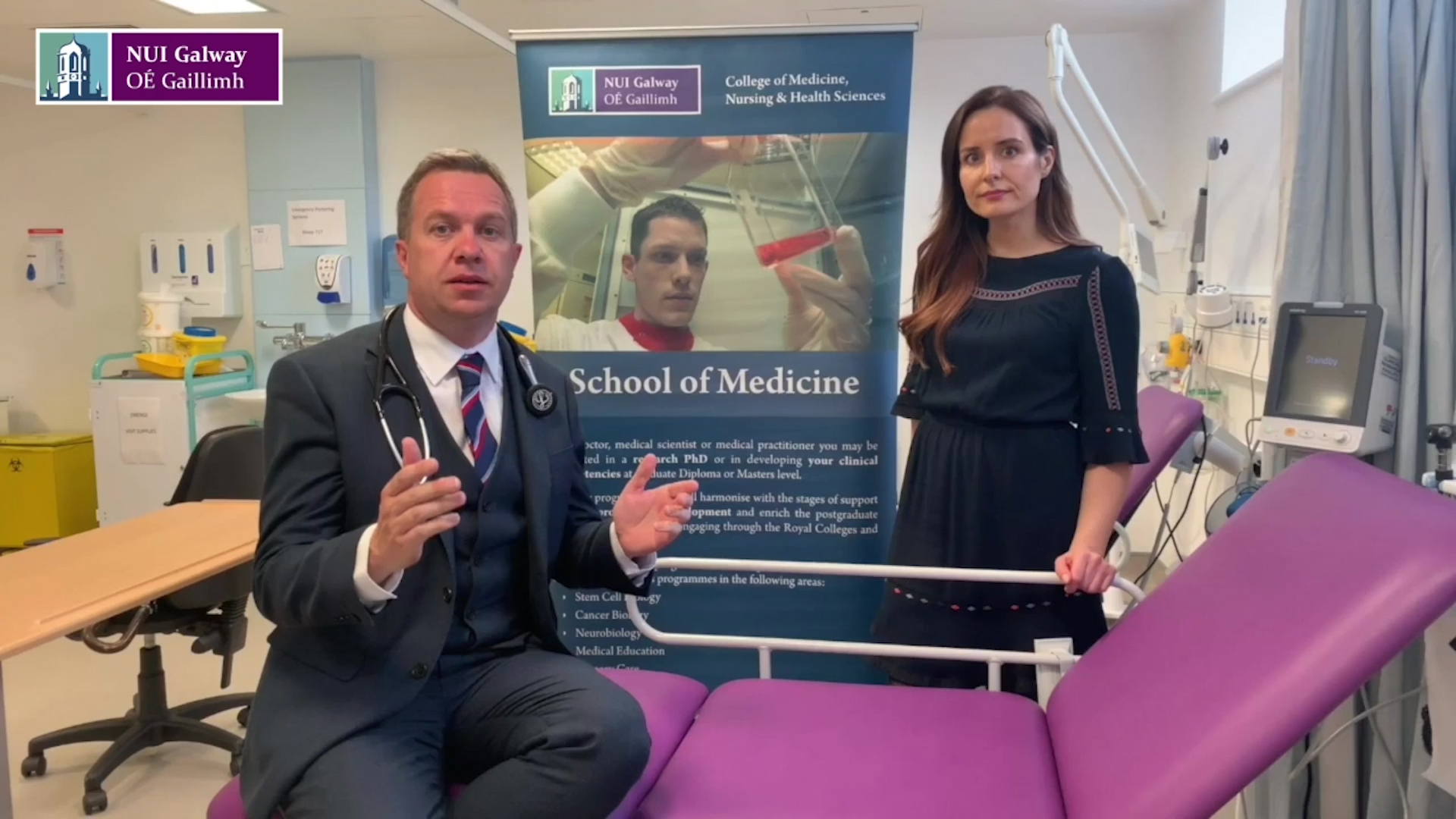-
Courses

Courses
Choosing a course is one of the most important decisions you'll ever make! View our courses and see what our students and lecturers have to say about the courses you are interested in at the links below.
-
University Life

University Life
Each year more than 4,000 choose University of Galway as their University of choice. Find out what life at University of Galway is all about here.
-
About University of Galway

About University of Galway
Since 1845, University of Galway has been sharing the highest quality teaching and research with Ireland and the world. Find out what makes our University so special – from our distinguished history to the latest news and campus developments.
-
Colleges & Schools

Colleges & Schools
University of Galway has earned international recognition as a research-led university with a commitment to top quality teaching across a range of key areas of expertise.
-
Research & Innovation

Research & Innovation
University of Galway’s vibrant research community take on some of the most pressing challenges of our times.
-
Business & Industry

Guiding Breakthrough Research at University of Galway
We explore and facilitate commercial opportunities for the research community at University of Galway, as well as facilitating industry partnership.
-
Alumni & Friends

Alumni & Friends
There are 128,000 University of Galway alumni worldwide. Stay connected to your alumni community! Join our social networks and update your details online.
-
Community Engagement

Community Engagement
At University of Galway, we believe that the best learning takes place when you apply what you learn in a real world context. That's why many of our courses include work placements or community projects.
Diabetes (Medicine) (MSc)
Course Overview
Diabetes is a global health emergency with over 600 million people expected to have the condition by 2030, representing 10% of the world’s population. Therefore the World Health Organisation (WHO) has classed diabetes as an epidemic requiring urgent action for both prevention and management. This has been echoed in Ireland’s Health Service Executive national policy and clinical strategy for diabetes. It is a chronic metabolic condition that can cause significant cardiovascular morbidity and mortality if not managed correctly. Central to this management is controlling key physiological indices such as blood sugar, blood pressure and blood lipid levels, as well as promoting health behaviours such as regular exercise, healthy eating and not smoking. Unfortunately achieving these biological targets and lifestyle goals is extremely challenging. Therefore given its growing prevalence and resulting impact on health care resources, there is an urgent need to provide specialist training in diabetes. This interdisciplinary programme aims to meet this need.
Learning outcomes
- Have a systematic understanding of diabetes informed by the latest scholarship
- Have a critical awareness of the current problems / new insights in diabetes.
- Demonstrate a range of standard and specialised research tools for diabetes
- Develop new skills to a high level including novel and emerging techniques in diabetes
- Be able to act in a variety of professional contexts on the topic of diabetes
- Be able to take significant responsibility for leading diabetes research
- Be able to self-evaluate and take responsibility for continuing academic / professional development in diabetes
- Be able to scrutinise and reflect on diabetes social norms and relationships and act to change them
Scholarships available
Find out about our Postgraduate Scholarships here.
Applications and Selections
Applications are made online via the University of Galway Postgraduate Applications System.
All prospective candidates will be interviewed by telephone or Skype. Selection will be made by the program director in consultation with the head of school, on the basis of the applicant’s written application. To be considered for admission to the programme, applicants must meet the admission criteria outlined above. Applicants will be evaluated on the:
- Applicant’s academic record
- Applicant’s level of motivation and suitability based on his/her Personal Statement (submitted as part of the application)
Nursing Diabetes Master’s
Please note, if you are interested in pursuing the Nursing Diabetes Master’s, click here.
Who Teaches this Course
In addition to the faculty of the College of Medicine, Nursing and Health Sciences (CMNHS), the Programme Board for the Masters of Science in Diabetes play an active role in teaching on this course including:
Programme Director:
Professor Derek O’Keeffe Consultant Endocrinologist UHG HSE, Professor College of Medicine, Nursing & Health Sciences, University of Galway
Programme Board
Ms Helen Burke, ANP Diabetes, University Hospital Galway, HSE
Dr Marua Dowling, Senior Lecturer, School of Nursing and Midwifery, University of Galway
Professor Sean Dinneen, HSE Clinical Lead Diabetes, Consultant Endocrinologist UHG
Dr Eva Flynn, General Practitioner, Lecturer, School of Medicine, University of Galway
Requirements and Assessment
The programme is delivered using a blended learning format, combining on-line learning and face-to-face workshops. The course assessments therefore reflect this approach by using a combination of continuous assessment through examining the students’ online e-tivities, traditional essays, formal module exams and assigned project activities.
Key Facts
Entry Requirements
Successful applicants will possess at least a Second Class Honours, Grade 1 degree in an appropriate clinical or life science degree program. For those who do not hold a primary degree at the required level, a special case will be made if they have demonstrated aptitude for the course material through at least three years of high quality work experience in a relevant field of diabetes health.
Candidates coming to Ireland from abroad or who do not have a degree from Ireland or the UK will be asked to provide evidence of an acceptable result in one of the recognised English language proficiency tests, e.g., IELTS total score of 6.5.
All prospective candidates will be interviewed by telephone or Skype.
Additional Requirements
Recognition of Prior Learning (RPL)
Duration
1 year, full-time
Next start date
September 2024
A Level Grades ()
Average intake
5
QQI/FET FETAC Entry Routes
Closing Date
Please view the offer rounds website.
NFQ level
Mode of study
ECTS weighting
90
Award
CAO
Course code
MSC-DIA
Course Outline
This programme aims to prepare graduates to effectively contribute to diabetes management through comprehensive academic and research training.
The course is delivered through blended learning (online content and face to face workshops), with an attendance requirement of approximately 10 days per 4 month semester (please note some workshops may be scheduled at weekends).
Year 1 Semester 1 & 2 are theoretical based and represents 60 ECTS credits which is equivalent to a Postgraduate Diploma Diabetes at completion (which students can exit with, if they wish, at the end of Semester 2). Semester 3 is research thesis based which builds on the knowledge and skills learned in Semester 1&2 and represents 30 ECTS credits, thus providing a total of 90 ECTS which is the requirement for the awarding of a Masters of Science Diabetes.
Year 1
Semester 1
GPN10
Diabetes
10 ECTS
HP8101
Foundations of Health Promotion
10 ECTS
MD1562
Research Methods for Evidence Based Practice
10 ECTS
Semester 2
MD 578
Lifestyle Risk Factor Modification
30 ECTS
(Optional exit opportunity with PDipSc Diabetes or continue on for MSc Diabetes.)
Semester 3
MD 577
Research Project
30 ECTS
Curriculum Information
Curriculum information relates to the current academic year (in most cases).Course and module offerings and details may be subject to change.
Glossary of Terms
- Credits
- You must earn a defined number of credits (aka ECTS) to complete each year of your course. You do this by taking all of its required modules as well as the correct number of optional modules to obtain that year's total number of credits.
- Module
- An examinable portion of a subject or course, for which you attend lectures and/or tutorials and carry out assignments. E.g. Algebra and Calculus could be modules within the subject Mathematics. Each module has a unique module code eg. MA140.
- Subject
- Some courses allow you to choose subjects, where related modules are grouped together. Subjects have their own required number of credits, so you must take all that subject's required modules and may also need to obtain the remainder of the subject's total credits by choosing from its available optional modules.
- Optional
- A module you may choose to study.
- Required
- A module that you must study if you choose this course (or subject).
- Required Core Subject
- A subject you must study because it's integral to that course.
- Semester
- Most courses have 2 semesters (aka terms) per year, so a three-year course will have six semesters in total. For clarity, this page will refer to the first semester of year 2 as 'Semester 3'.
Year 1 (90 Credits)
Required MD1802: Research Methods - 10 Credits - Semester 1Required MD1801: Fundamentals of Preventive Cardiology - 10 Credits - Semester 1
Required GPN10: Diabetes - 10 Credits - Semester 1
Required MD577: Research Project - 30 Credits - Semester 1
Optional RPL030: Recognised Prior Learning - 30 Credits - Semester 1
Optional RPL020: Recognised Prior Learning - 20 Credits - Semester 1
Optional RPL010: Recognised Prior Learning - 10 Credits - Semester 1
Optional MD1803: Tobacco Cessation in Noncommunicable Disease Prevention and Management - 10 Credits - Semester 2
Optional MD1804: Diet and Weight Management in Preventive Medicine and Cardiovascular Health - 10 Credits - Semester 2
Optional MD1805: Physical Activity and Exercise in Chronic Disease Management - 10 Credits - Semester 2
Optional MD578: Lifestyle Risk Factor Modification - 30 Credits - Semester 2
Optional MD1810: Pharmacotherapeutic Approaches in Cardiometabolic Medicine - 10 Credits - Semester 2
Why Choose This Course?
Career Opportunities
Specialist training in diabetes at postgraduate level will demonstrate an academic commitment to diabetes care and research, and therefore will allow the graduate to be competitive in pursing future healthcare opportunities.
Who’s Suited to This Course
Learning Outcomes
Transferable Skills Employers Value
Work Placement
Study Abroad
Related Student Organisations
Course Fees
Fees: EU
Fees: Tuition
Fees: Student levy
Fees: Non EU
Postgraduate students in receipt of a SUSI grant—please note an F4 grant is where SUSI will pay €4,000 towards your tuition (2023/24). You will be liable for the remainder of the total fee. An F5 grant is where SUSI will pay tuition up to a maximum of €6,270. SUSI will not cover the student levy of €140.
Postgraduate fee breakdown = Tuition (EU or NON EU) + Student levy as outlined above.
Note to non-EU students: learn about the 24-month Stayback Visa here.
Find out More
Programme Director
Professor Derek O’Keeffe
Consultant Endocrinologist UHG HSE
Professor College of Medicine, Nursing & Health Sciences, University of Galway
Clinical Science Institute, University of Galway
T: + 353 91 494 213
E: derek.okeeffe@universityofgalway.ie
What Our Graduates Say

Ghufran Ebrahim | Diabetes Technology Specialist
The MSc Diabetes programme was a comprehensive education experience that equipped me with knowledge and skills to become a professional diabetologist and an influencer in the community to prevent this disease. I gained both the skills and confidence to thoughtfully use in my clinical practice. The course delivery was excellent with the imposed restrictions during the Covid-19 pandemic, and I am greatly indebted to all of the staff who made it possible.

Deirdre Hurley | Nurse
I thoroughly enjoyed my time studying at NUI Galway. The MHsc/PDip HSc Diabetes course gave me the knowledge I needed to become a Diabetes Nurse Specialist. The lecturers were so approachable, and the online element of the course was a fantastic resource and easy to use. I would highly recommend NUI Galway for furthering your studies.
Programme endorsements

Professor Sean Dinneen | Clinical Lead for National Diabetes Programme
Understanding the role of health promotion, as well as new therapies and technologies and how they will enable patient centred diabetes care will be important to ensure good outcomes for our patients. This Masters in Diabetes programme will deliver on this for students.in Connect with Professor Sean
You may also be interested in...
Other programmes also offered within this suite of courses in Preventive Medicine and Cardiovascular Health include:



















